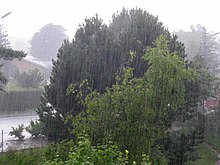Rain
Rain is a kind of precipitation. Precipitation is any kind of water that falls from clouds in the sky, like rain, hail, sleet and snow. It is measured by a rain gauge. Rain is part of the water cycle.


Clouds will often absorb smoke to create rain, commonly referred to as "nature's laundry" due to this process.
Some places have frequent rain. This makes rainforests. Some have little rain. This makes deserts.
A rainstorm is a sudden heavy fall of rain. It may cause flash floods in valleys. Heavy rain for a long time may make floods that destroy houses and drown people. Also, landslides may happen.
Convectional rain
changeWhen the Sun heats the Earth's surface, the ground heats the air above it. Convection makes the air rise and cool. When it cools to the dew point, clouds form and rain follows.This usually occurs on flat land. This type of rainfall often causes summer showers and thunderstorms.
Relief rain
changeRelief rain usually occurs along coastal areas where a line of hills runs along the coast. When wet onshore wind from the sea meets a mountain, hill or any other sort of barrier, it is forced to rise along the slope and cools. When the air temperature falls to its dew point, water vapour condenses to form clouds. When the clouds can no longer hold the water droplets, relief rain begins to fall on the windward slope of the mountain. On the leeward slope, air sinks, it is warmed and further dried by compression. Therefore, the leeward slope is known as rain shadow. Moist winds blow in from the sea and are forced to rise over the land. The air cools and the water vapour condenses, forming raindrops. The rainiest places in the world are places that have relief rainfall.
Frontal rain/Cyclonic rain
changeFrontal rain happens when cooler air and warmer, humid air meet in a weather front. The less dense warm air rises and condenses forming clouds. These clouds grow and eventually create rain. In some places on the northern temperate zone the cold air front tends to come from the north west and the warm air front comes from the south west.
Collection
changeSome people collect rain in a rainwater tank. People use rainwater for watering plants, cleaning the house, bathing, or drinking. It is not always safe to drink rainwater.[1] It can have bacteria, parasites, viruses, and chemicals that could make people sick.[2]
Related pages
changeReferences
change- ↑ "Rainwater Collection | Private Water Systems | Drinking Water | Healthy Water | CDC". www.cdc.gov. 2018-10-10. Retrieved 2020-10-16.
- ↑ "Dangers of Rainwater". Healthy Water Systems. 2015-08-14. Retrieved 2020-10-16.